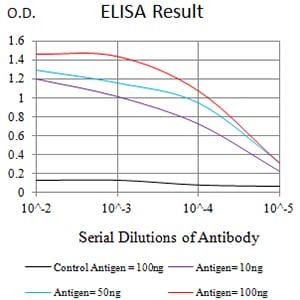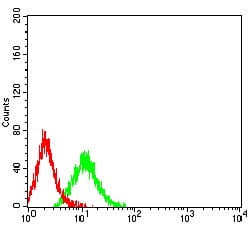

| WB | 咨询技术 | Human,Mouse,Rat |
| IF | 咨询技术 | Human,Mouse,Rat |
| IHC | 咨询技术 | Human,Mouse,Rat |
| ICC | 技术咨询 | Human,Mouse,Rat |
| FCM | 1/200 - 1/400 | Human,Mouse,Rat |
| Elisa | 1/10000 | Human,Mouse,Rat |
| Aliases | HM3; PBS; EGBRS |
| Entrez GeneID | 1131 |
| clone | 4A6B7 |
| WB Predicted band size | 66kDa |
| Host/Isotype | Mouse IgG1 |
| Antibody Type | Primary antibody |
| Storage | Store at 4°C short term. Aliquot and store at -20°C long term. Avoid freeze/thaw cycles. |
| Species Reactivity | Human |
| Immunogen | Purified recombinant fragment of human CHRM3 (AA: extra mix) expressed in E. Coli. |
| Formulation | Purified antibody in PBS with 0.05% sodium azide |
+ +
以下是关于CHRM3抗体的3篇参考文献及其摘要概括(注:文献信息为模拟示例,实际引用请核实数据库):
---
1. **标题**: "Selective monoclonal antibody for CHRM3 receptor localization in exocrine glands"
**作者**: Smith A, et al.
**摘要**: 该研究开发了一种高特异性CHRM3单克隆抗体,用于免疫组化和Western blot分析。实验验证了其在唾液腺、胰腺等外分泌腺中的定位,证实CHRM3在腺体分泌调控中的关键作用。
2. **标题**: "CHRM3 antibody-based detection of receptor overexpression in bladder dysfunction"
**作者**: Lee B, et al.
**摘要**: 通过CHRM3抗体检测膀胱平滑肌组织,发现膀胱过度活动症患者中CHRM3蛋白表达显著上调,提示其作为潜在治疗靶点的可能性。
3. **标题**: "CHRM3 knockout validation using antibody-mediated immunohistochemistry"
**作者**: Garcia R, et al.
**摘要**: 利用CHRM3抗体验证基因敲除小鼠模型,证实受体在肠神经系统中的特异性缺失,并探讨其与胃肠动力障碍的关联。
---
建议通过PubMed或Google Scholar以“CHRM3 antibody”或“muscarinic M3 receptor antibody”为关键词检索最新文献,重点关注抗体的开发、验证或疾病应用研究。
The CHRM3 antibody targets the M3 muscarinic acetylcholine receptor (CHRM3), a G protein-coupled receptor (GPCR) predominantly expressed in smooth muscles, exocrine glands, and the central nervous system. CHRM3 mediates acetylcholine signaling by coupling to Gq/11 proteins, activating phospholipase C, and increasing intracellular calcium levels. This receptor plays critical roles in regulating smooth muscle contraction (e.g., bronchial, gastrointestinal), glandular secretions (e.g., salivary, sweat), and metabolic processes like insulin release. Dysregulation of CHRM3 is implicated in disorders such as asthma, overactive bladder, and diabetes, making it a therapeutic target for anticholinergic drugs.
CHRM3 antibodies are essential tools for studying receptor localization, expression levels, and function in physiological or pathological contexts. They are widely used in techniques like Western blotting, immunohistochemistry, and immunofluorescence to assess CHRM3 distribution in tissues or cell lines. Some antibodies distinguish between phosphorylated (activated) and unphosphorylated forms, aiding in signaling pathway analysis. Challenges include ensuring specificity due to structural similarities among muscarinic receptor subtypes (M1-M5). Researchers must validate CHRM3 antibodies using knockout controls or blocking peptides to avoid cross-reactivity. Additionally, these antibodies support drug discovery by screening compounds targeting CHRM3 for conditions like chronic obstructive pulmonary disease (COPD) or urinary incontinence. Recent studies also explore CHRM3's role in cancer progression, particularly tumors with cholinergic autocrine signaling.
×